Crispy slow roasted duck served alongside savory duck fat potatoes and delicious braised red cabbage — this czech-inspired feast is perfect for your next holiday celebration!
Our apartment in Prague was right above a little pub where the most popular menu item was roasted duck with caraway — pečená kachna na kmíně. Whenever I was in the mood for something ultra comforting, the delicious aroma wafting up to our apartment would draw me downstairs for the duck dinner served with flavorful braised red cabbage and bread dumplings. Our roasted duck recipe here keeps the classic Czech flavors, but swaps out the bread dumplings for duck fat potatoes — an easy and deliciously crispy addition!
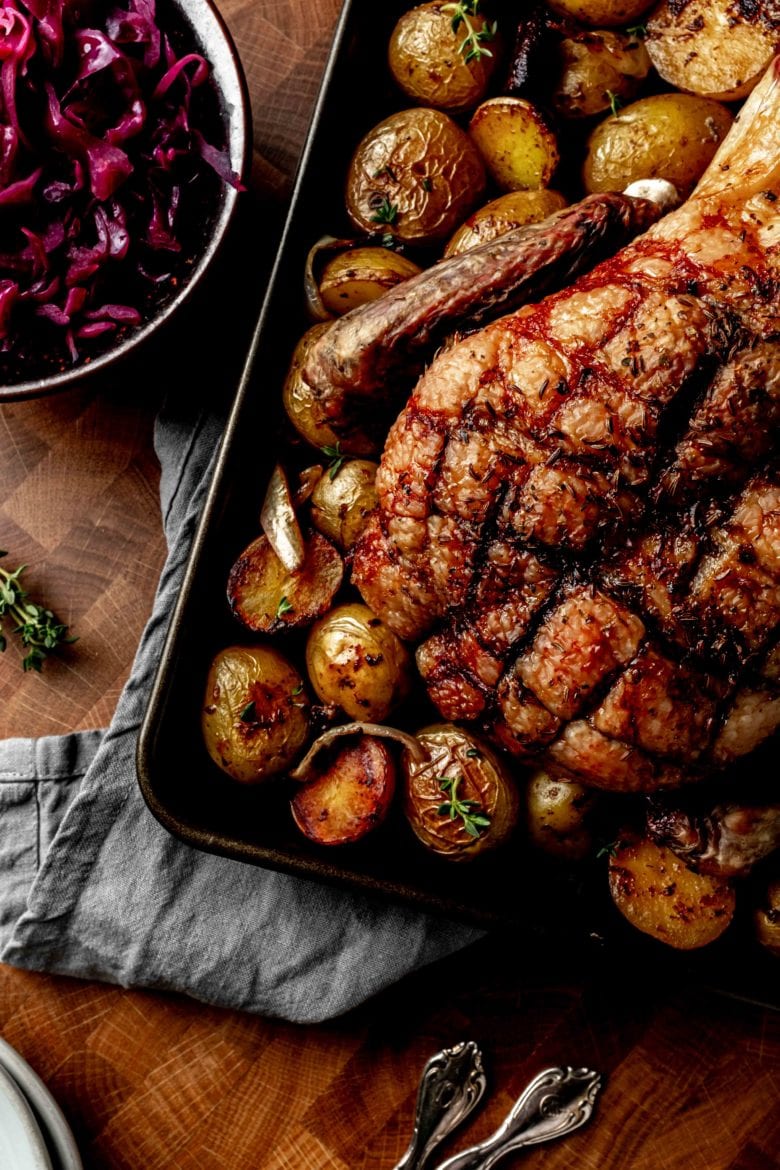
preparing the duck
Slow roasting duck at a low temperature produces incredibly tender meat with a perfectly crispy skin. While this method is less used in the States, I prefer it for its simple and no-fuss nature — no need to flip the duck or even open the oven for the first four hours! It also gives plenty of time for the fat to render, an incredibly important factor in getting less greasy meat and crispier skin.
The day before
If you’ve bought a frozen duck, make sure to let it thaw in you refrigerator for a good 2-3 days. The day before cooking you’ll want to remove any giblets and trim off any excess fat. Then sprinkle the duck all over (inside and out) with kosher salt and set it on a wire rack breast-side down. Place a pan underneath the rack to catch any liquid and place it in the refrigerator overnight.
This process of salting and resting the duck (dry brining) will draw out moisture, while the salt dissolves and is reabsorbed into the duck. This results in more flavor and a nice crispy skin!
Day of cooking
Before you put your duck in the oven, you’ll need to pierce little holes all over the skin with a sharp knife. If you’re having trouble piercing the skin, we’ve found that using kitchen scissors to make little snips works just as well. Just make sure to avoid piercing the meat, as this can cause a tougher texture. Then score the skin over the breast in a diamond pattern, again making sure not to pierce the meat. These steps are incredibly important, as they will help the duck fat render!
Now it’s time for the seasonings. You salted your duck yesterday so today you’ll just be adding marjoram and caraway seed. Then you’ll stuff the duck with fresh thyme, whole cloves of garlic and roughly chopped onion and apple. These aromatics will help infuse the duck as it cooks and also keep the meat juicy. To keep the filling in (and for a prettier presentation) tie the duck legs together with kitchen twine.
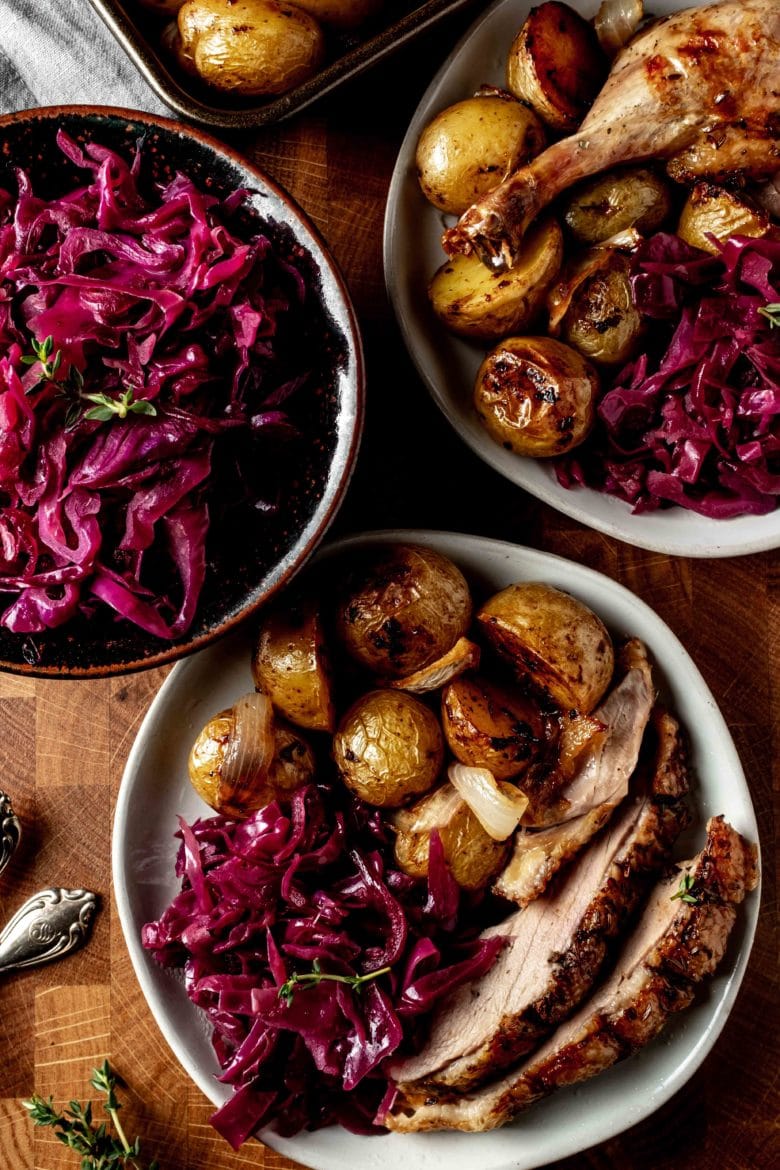
slow roasted duck and potatoes
The duck is ready so now we can get it into the oven! We’ll be roasting it for five hours. Here’s our oven schedule:
4 hours at 250 F (120 C)
The first four hours you can kick back and relax. In fact, you should make sure not to even open the oven at all!
30 minutes at 250 F (120 C)
After four hours, you’ll remove your duck from the oven and set the wire rack and duck aside. Drain all but about 2-3 tablespoons of fat from the bottom of the roasting pan, but don’t discard the excess fat. You’ll need another few tablespoons for the braised red cabbage recipe below. Add your baby potatoes and a bit of onion to the roasting pan. Toss to coat with the duck fat and sprinkle generously with salt. Now return the duck to the pan and send everything back to the oven for 30 minutes.
20 minutes at 400 F (200 C)
Now crank up the oven to 400 F (200 C) so we can get really crispy duck skin! As soon as that skin is nice and crispy remove the duck from the oven and set aside to rest.
15 minutes at 400 F (200 C)
Send the potatoes back to the oven to finish cooking while the duck is resting — they’ll be perfectly cooked and nice and hot when you’re ready to serve!
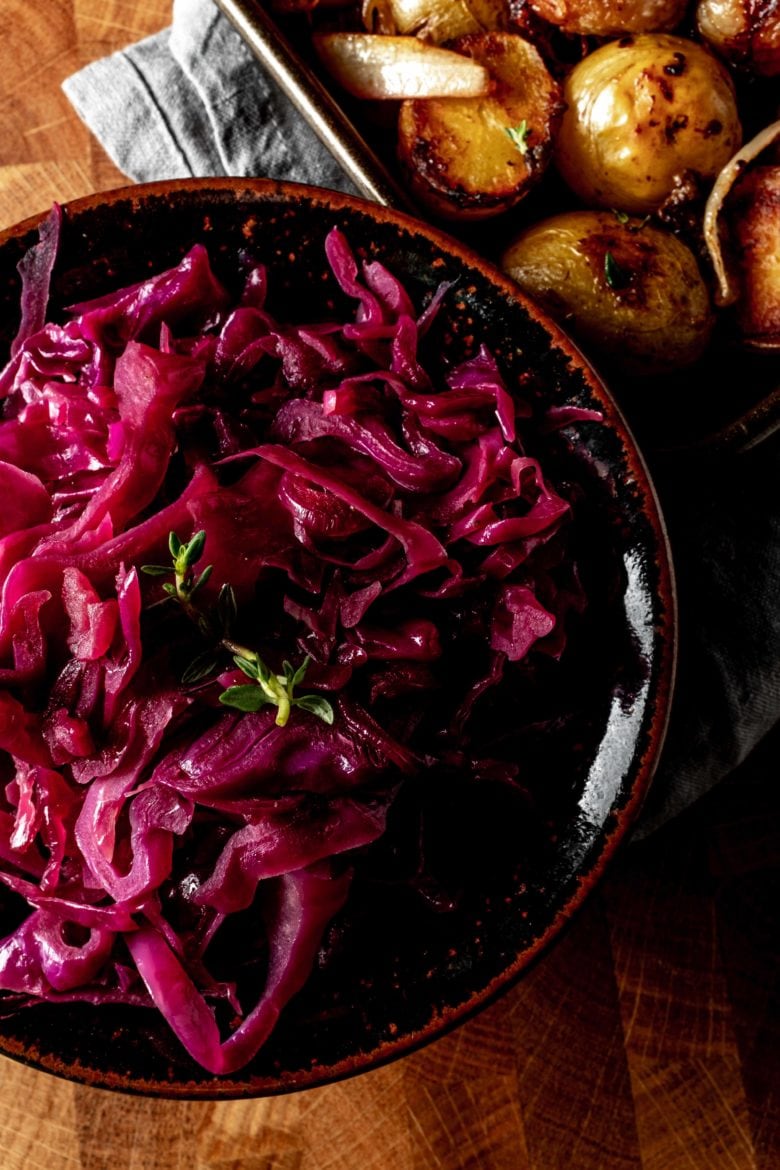
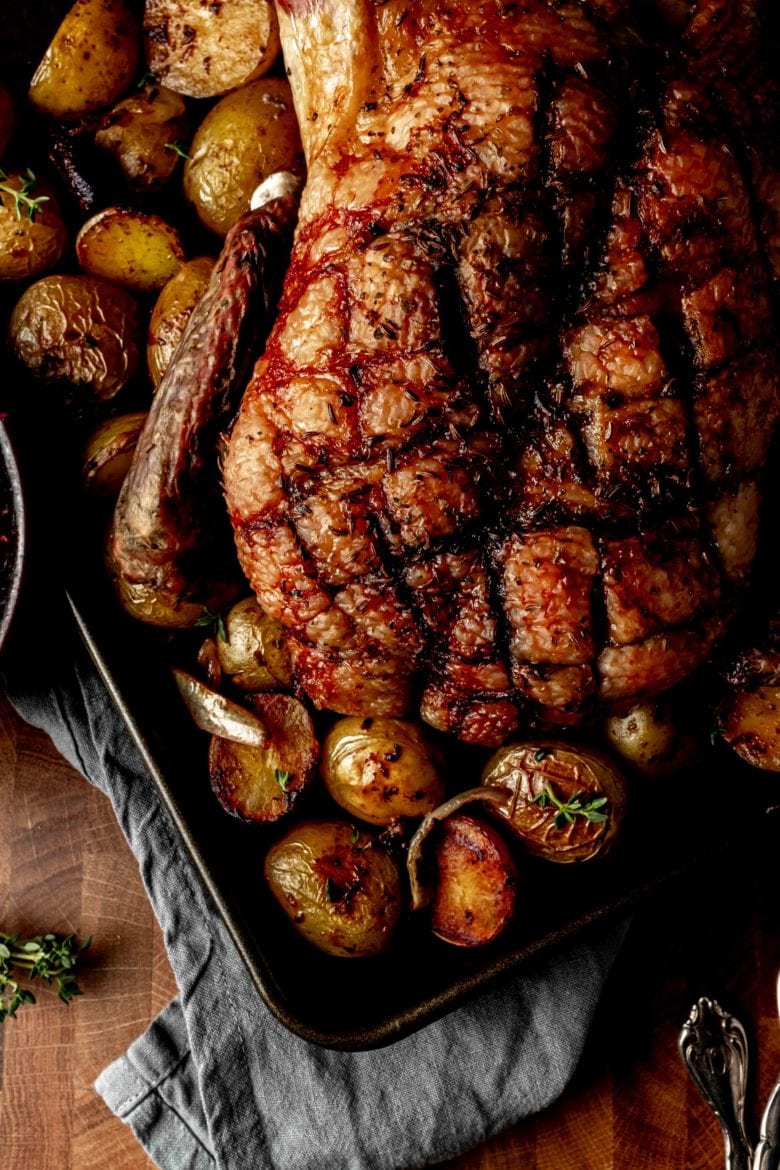
braised red cabbage
The braised red cabbage also begins with two tablespoons of duck fat, though you could definitely use butter or even olive oil if you prefer.
Start by sauteing thinly sliced red onion in the fat or oil of your choice, then add the shredded red cabbage. Pour in your liquids — a bit of red wine and apple cider vinegar — and stir in one diced apple. Add brown sugar, a pinch of cloves and salt to taste, give the mixture a good stir and then cover and let it simmer until you’re ready to enjoy!
The red cabbage will need at least 45 minutes, but you can let it simmer for up to an hour and a half for an even softer texture. About one hour is generally perfect for me!
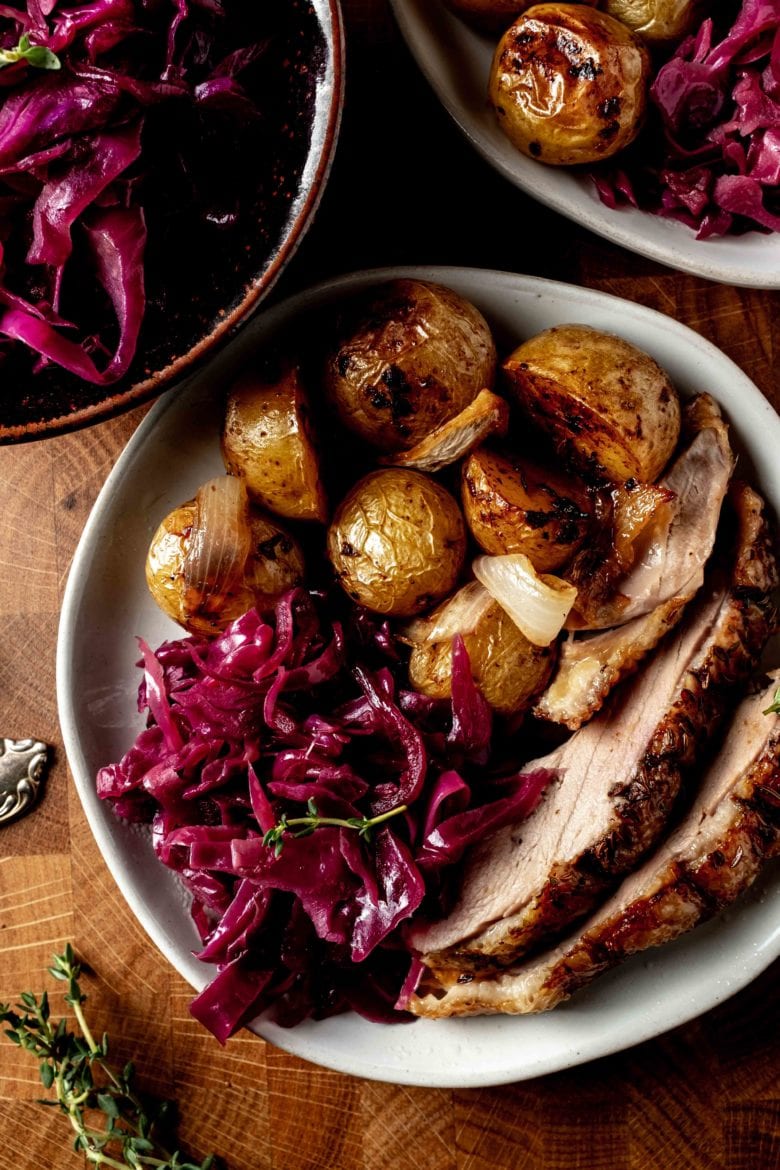
Looking for the perfect dessert for this meal? Try our Czech buchty, which are jam filled sweet buns!
And for more sunday dinner inspiration, make sure to check out these recipes!
- Easy St. Louis Ribs in Oven
- Reverse Sear Rack of Lamb with Dijon Mustard Sauce + Herby Farro
- Cast Iron Pizza (on the grill or in the oven) and easy poolish pizza dough
- Homemade Runzas
- Homemade Corned Beef and Cabbage
- Beef Barbacoa Tacos
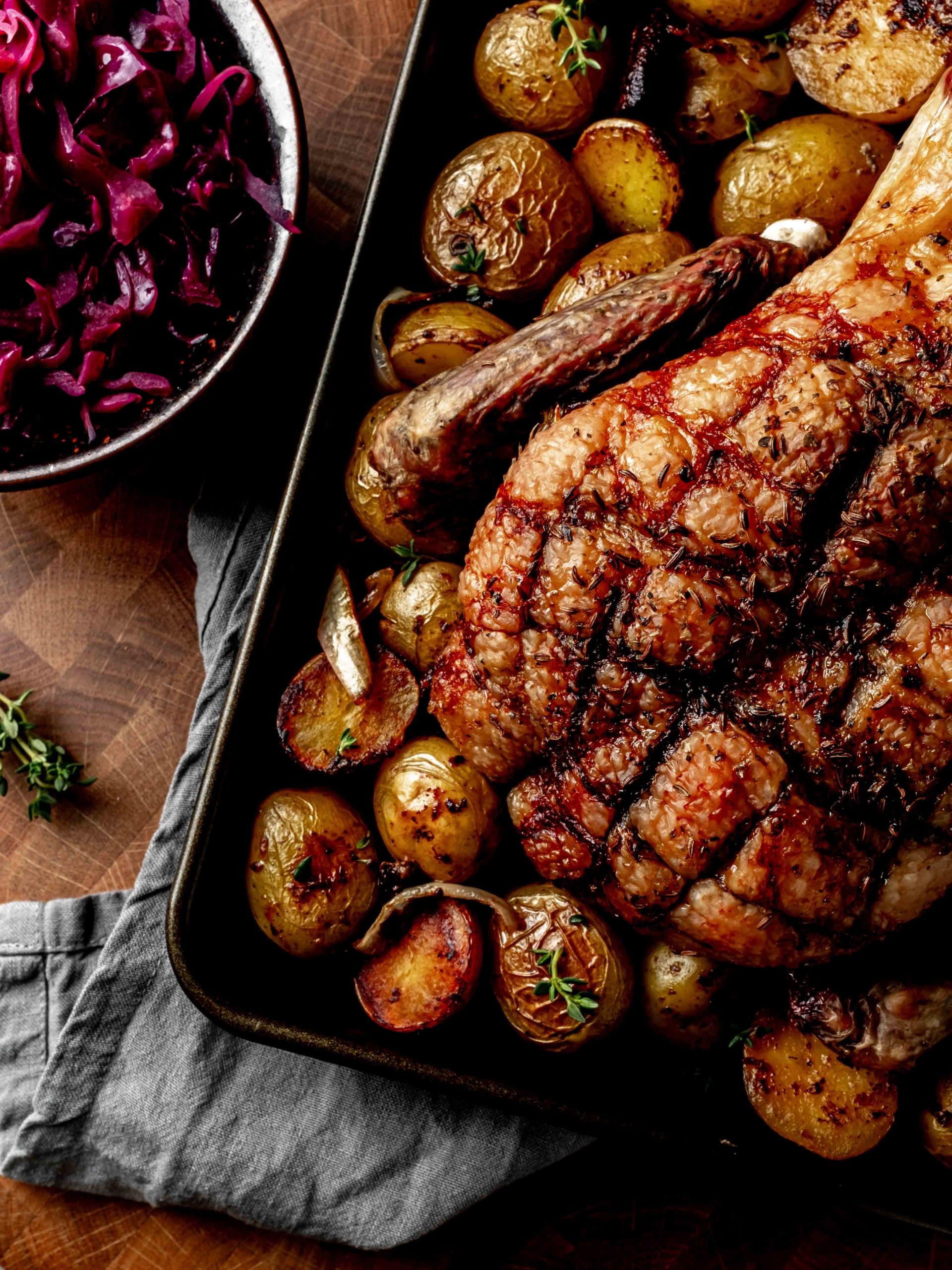
slow roasted duck and potatoes + braised red cabbage
- Total Time: 6 hours
- Yield: 4-6
- Prep Time: 30 minutes
- Cook Time: 5 hours 30 minutes
- Cuisine: czech
Ingredients
slow roasted duck
- 4–5 pounds (2.5 kg) pekin duck
- 1–1.5 tablespoons kosher salt
- 1.5 teaspoons caraway seed
- 1.5 teaspoons marjoram
- 1 small apple (I use honeycrisp)
- 1 small yellow onion
- 6 cloves garlic
- 5 sprigs thyme
duck fat potatoes
- 1.5 pounds (680 grams) baby potatoes
- 1 small yellow onion
- kosher salt to taste
braised red cabbage
- 2 tablespoons duck fat
- 1 small red onion
- 1 small (or ½ large) red cabbage (about 800 g shredded)
- ½ cup (120 ml) dry red wine
- ¼ cup (60 ml) apple cider vinegar
- 1 small tart apple
- 2 tablespoons brown sugar
- ¼ teaspoon ground cloves
- kosher salt to taste
Instructions
slow roasted duck + duck fat potatoes
- One day in advance: Remove any giblets from the duck and trim off any excess fat. Pat the duck dry and season inside and out with kosher salt. Place breast-side down on a pan fitted with a wire rack and let sit in the refrigerator uncovered overnight.
- Day of cooking: Preheat oven to 250 F (120 C).
- Prick the skin all over with a sharp knife at an angle, making sure not to pierce the meat. Use a sharp knife to score the skin over the breast in a diamond pattern, again making sure not to cut into the meat.
- Rub the duck inside and out with caraway and marjoram.
- Roughly chop the apple and onion. Stuff the cavity with the apple, onion, peeled garlic cloves and thyme. Use cooking twine to tie the legs.
- Place the duck breast-side up in a roasting pan fitted with a wire rack. Tuck the wings under the duck. Roast for 4 hours (don’t open the oven during this time).
- Remove the duck from the oven and set aside the wire rack and duck. Drain all but 2-3 tablespoons of duck fat gathered in the bottom of the pan. Don’t throw the excess fat away – you’ll need a bit for the cabbage recipe below.
- Cut any larger potatoes in half and roughly chop the onion. Add the potatoes and onion to the roasting pan and toss to coat. Sprinkle generously with salt. Return the duck and wire rack to the roasting pan on top of the potatoes.
- Return the duck to the oven and cook for 30 minutes.
- Increase the temperature to 400 F (200 C). Cook for 20-25 minutes or until the duck skin is nice and crispy. Transfer the duck to a cutting board to rest. Return the potatoes to the oven to finish cooking for 15 minutes while the duck is resting.
- Discard the apples, onion and garlic before serving.
braised red cabbage
- Prepare the veggies. Thinly slice the red onion. Core and shred the cabbage. Peel and finely dice the apple.
- Heat 2 tablespoons of duck fat in a large pot over medium heat and add the red onion. Cook for 3 minutes.
- Add the red cabbage and continue cooking another 3 minutes.
- Pour in the red wine and apple cider vinegar. Add the diced apple, brown sugar, cloves and salt. Stir to combine.
- Bring the mixture to a simmer, cover and reduce heat to low. Cook for 1 hour, stirring occasionally.
This post may contain affiliate links through which we may earn a small commission at no additional cost to you. We only recommend products that we genuinely love and would use ourselves.